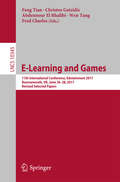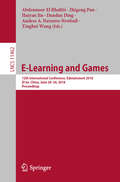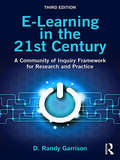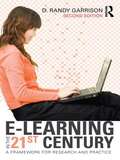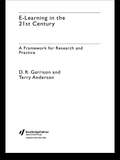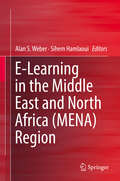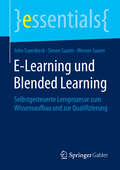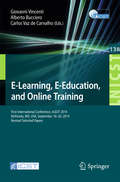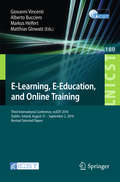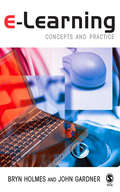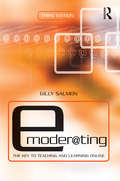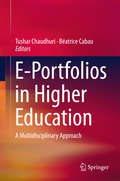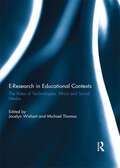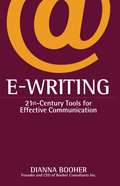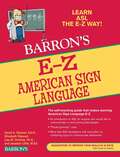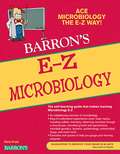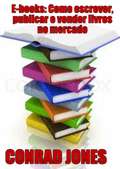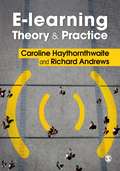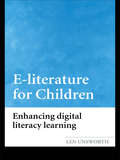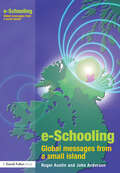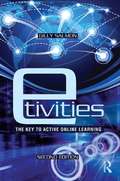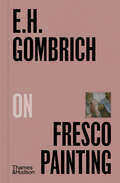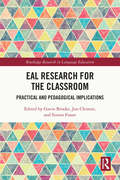- Table View
- List View
E-Learning and Games
by Christos Gatzidis Feng Tian Abdennour El Rhalibi Wen Tang Fred CharlesThis book constitutes the refereed proceedings of the 10th International Conference on E-Learning and Games, Edutainment 2016, held in Hangzhou, China, in April 2016. The 36 full papers presented were carefully reviewed and selected from 60 submissions. They are organized in the following topical sections: E-learning and game; graphics, imaging and applications; intelligent data analytics and visualization.
E-Learning and Games: 12th International Conference, Edutainment 2018, Xi'an, China, June 28–30, 2018, Proceedings (Lecture Notes in Computer Science #11462)
by Zhigeng Pan Abdennour El Rhalibi Haiyan Jin Dandan Ding Andres A. Navarro-Newball Yinghui WangThis book constitutes the refereed proceedings of the 12th International Conference on e-Learning and Games, EDUTAINMENT 2018, held in Xi’an, China, in June 2018. The 32 full and 32 short papers presented in this volume were carefully reviewed and selected from 85 submissions. The papers were organized in topical sections named: virtual reality and augmented reality in edutainment; gamification for serious game and training; graphics, imaging and applications; game rendering and animation; game rendering and animation and computer vision in edutainment; e-learning and game; and computer vision in edutainment.
E-Learning in the 21st Century: A Community of Inquiry Framework for Research and Practice
by D. Randy GarrisonThe third edition of E-Learning in the 21st Century provides a coherent, comprehensive, and empirically-based framework for understanding e-learning in higher education. Garrison draws on his decades of experience and extensive research in the field to explore technological, pedagogical, and organizational implications. The third edition has been fully updated throughout and includes new material on learning technologies, MOOCs, blended learning, leadership, and the importance and role of social connections in thinking and learning, highlighting the transformative and disruptive impact that e-learning has recently had on education.
E-Learning in the 21st Century: A Framework for Research and Practice
by D. Randy GarrisonThere is currently a technological revolution taking place in higher education. The growth of e-learning is being described as explosive, unprecedented, and above all, disruptive. This timely and comprehensive book provides a coherent framework for understanding e-learning in higher education.The authors draw on their extensive research in the area to explore the technological, pedagogical and organisational implications of e-learning, and more importantly, they provide practical models for educators to use to realise the full potential of e-learning. A unique feature of the book is that the authors focus less on the ever-evolving technologies and more on the search for an understanding of these technologies from an educational perspective.This book will be invaluable for researchers, practitioners and senior administrators looking for guidance on how to successfully adopt e-learning in their institutions. It will also appeal to anyone with an interest in the impact of e-learning on higher education and society.
E-Learning in the 21st Century: A Framework for Research and Practice
by D. Randy GarrisonThere is currently a technological revolution taking place in higher education. The growth of e-learning is being described as explosive, unprecedented, and above all, disruptive. This timely and comprehensive book provides a coherent framework for understanding e-learning in higher education.The authors draw on their extensive research in the area to explore the technological, pedagogical and organisational implications of e-learning, and more importantly, they provide practical models for educators to use to realise the full potential of e-learning. A unique feature of the book is that the authors focus less on the ever-evolving technologies and more on the search for an understanding of these technologies from an educational perspective.This book will be invaluable for researchers, practitioners and senior administrators looking for guidance on how to successfully adopt e-learning in their institutions. It will also appeal to anyone with an interest in the impact of e-learning on higher education and society.
E-Learning in the Middle East and North Africa (MENA) Region
by Alan S. Weber Sihem HamlaouiIn the last decade, due to factors of ICT infrastructural and broadband maturation, rising levels of educational attainment and computer literacy, and diversification strategies, e-learning has exploded in the Middle East and North Africa (MENA) region. However, significant barriers remain in the region’s e-learning development: lack of research on outcomes and effectiveness, paucity of Arabic language learning objects, monopolies and high cost of telecommunications, cultural taboos, accreditation, censorship, and teacher training.This unique volume is the first comprehensive effort to describe the history, development, and current state of e-learning in each of the 20 MENA countries from Algeria to Yemen. Each entry is expertly written by a specialist who is acutely familiar with the state of e-learning in their respective country, and concludes with a bibliography of key reports, peer-reviewed books and articles, and web resources.E-Learning in the Middle East and North Africa (MENA) proves itself as a vital compendium for a wide readership that includes academics and students, transnational program directors, international education experts, MENA government departments, commercial vendors and investors, and ICT development and regulatory agencies involved in e-learning in the Middle East.
E-Learning und Blended Learning: Selbstgesteuerte Lernprozesse zum Wissensaufbau und zur Qualifizierung (essentials)
by John Erpenbeck Werner Sauter Simon SauterDie Autoren beschreiben die Deutungen des Begriffes E-Learning und erläutern die Rahmenbedingungen sowie die Elemente von E-Learning Arrangements. Sie entwickeln ein praxiserprobtes Blended Learning Arrangement, das problemorientierte Workshops mit selbstgesteuertem Lernen auf der Basis von Web Based Trainings oder Lernvideos verknüpft. Erfolgsfaktoren für E-Learning und Blended Learning Arrangements werden analysiert, eine zuverlässige Konzeption der Lernbegleitung wird entwickelt. Die Autoren leiten zudem auf Basis ihrer langjährigen Projekterfahrung Fallstudien für E-Learning und Blended Learning in Verbindung mit Social Learning ab, welche sich durch eine konsequente Bedarfsorientierung, Effizienz und Wirtschaftlichkeit auszeichnen.
E-Learning, E-Education, and Online Training
by Carlos Vaz de Carvalho Giovanni Vincenti Alberto BuccieroThis book constitutes the proceedings of the SecondInternational Conference on E-Learning, E-Education, and Online Training, eLEOT2015, held in Novedrate, Italy, in September 2015. The 26 revised full papers presented were carefully reviewedand selected from 52 submissions. They focus on e-learning and distanceeducation in science, technology, engineering and math.
E-Learning, E-Education, and Online Training
by Markus Helfert Giovanni Vincenti Alberto Bucciero Matthias GlowatzThis book constitutes the proceedings of the 3rd International Conference on E-Learning, E-Education, and Online Training, eLEOT 2016, held in Dublin, Ireland, August 31 - September 2, 2016. The 25 revised full papers presented were carefully reviewed and selected from 35 submissions. They focus on topics as augmented reality learning, blended learning, learning analytics, mobile learning, virtual learning environments.
E-Learning: Concepts and Practice
by Bryn Holmes John R. Gardnere-Learning is now an essential component of education. Globalization, the proliferation of information available on the Internet and the importance of knowledge-based economies have added a whole new dimension to teaching and learning. As more tutors, students and trainees, and institutions adopt online learning there is a need for resources that will examine and inform this field. Using examples from around the world, the authors of e-Learning: Concepts and Practices provide an in-depth examination of past, present and future e-learning approaches, and explore the implications of applying e-learning in practice. Topics include: - educational evolution - enriching the learning experience - learner empowerment - design concepts and considerations - creation of e-communities - communal constructivism This book is essential reading for anyone involved in technology enhanced learning systems, whether an expert or coming new to the area. It will be of particular relevance to those involved in teaching or studying for information technology in education degrees, in training through e-learning courses and with developing e-learning resources. Bryn Holmes is an assistant professor in Education at Concordia University, Montreal and director of an Internet company, Inishnet, which offers research and consultancy in online education. John Gardner is a professor of education at Queen's University, Belfast and his main research areas include policy and practice in information and communications technology in education.
E-Moderating: The Key to Online Teaching and Learning (Open And Distance Learning Ser.)
by Gilly SalmonProfessor Gilly Salmon has achieved continuity and illumination of the seminal five stage model, together with new research-based developments, in her much-awaited third edition of E-Moderating – the most quoted and successful guide for e-learning practitioners. Never content to offer superficial revisions or simple "solutions" against the pace of technological advances, the expanding interest and requirements for online learning, and the changes they have wrought, E-Moderating, Third Edition offers a richness of applied topics that will directly impact learners and teachers of all kinds. The book is carefully crafted and supported with evidence, examples, and resources for practical guidelines, making it potentially transformational for all practitioners. E-Moderating, Third Edition includes: updates of literature, key terms, case studies and projects fresh examples of the use of the five stage model around the world, at different levels of education and across disciplines guidelines for moderating for podcasting and virtual worlds illustrations from the latest All Things in Moderation development programmes (www.atimod.com) new resources for practitioners a companion website: www.e-moderating.com.
E-Portfolios in Higher Education
by Tushar Chaudhuri Béatrice CabauThis book shares the collective experience of integrating electronic portfolios as assessment tools and as instruments for life-long learning in courses across various disciplines in higher education. It enables readers to trace the evolution of e-portfolios over the last ten years and to deal with the challenges faced by instructors and students when implementing e-portfolios in their respective courses. Further, the book suggests flexible ways of dealing with those challenges. It also highlights the relevance of electronic portfolios for the needs and demands of contemporary societies. As such, it speaks to a large target audience from a range of disciplines, roles and geographical contexts within the wider context of higher education in Asia and around the globe.
E-Research in Educational Contexts: The roles of technologies, ethics and social media
by Jocelyn Wishart and Michael ThomasThis book explores the impact of e-research in education and the opportunities presented by a new generation of research approaches and tools. ‘E-research’ is an umbrella term that encompasses all digital research methods used for data collection and analysis including those involving handheld mobile devices. This is a current concern as the emergence of online tools that enable people to collaborate, create, and share information has led to the widespread use of these new digital research methods. Indeed, new tools and technologies are emerging almost daily and are being taken up by researchers for their ease of data collection and analysis. As a result the book investigates the implications of how we conceptualise educational research in the digital age. In addressing a range of key themes, from the ethics of e-research to the relationships between researchers and participants, the book presents original studies from a variety of educational contexts where digital tools are being used, and should be of value to postgraduate students, academic researchers, and policy makers. This book was originally published as a special issue of the International Journal of Research & Method in Education.
E-Vanijya ani M-Vanijya Second Semester FYB.COM New NEP Syllabus - RTMNU: ई-वाणिज्य आणि एम-वाणिज्य दुसरे सत्र एफ.वाय.बी.कॉम. नवीन एन.इ.पी. अभ्यासक्रम - राष्ट्रसंत तुकडोजी महाराज नागपूर विद्यापीठ
by Dr Prakash Narayan Somalkar Dr Rajesh Sudhakar Dongreई-वाणिज्य आणि एम-वाणिज्य हे पुस्तक बी. कॉम. प्रथम वर्षाच्या दुसऱ्या सत्रातील Open Elective विषयासाठी तयार करण्यात आले आहे. या पुस्तकात माहिती तंत्रज्ञानातील प्रगती, ई-कॉमर्स आणि एम-कॉमर्सची संकल्पना, प्रकार, सेवा, फायदे, मर्यादा, इलेक्ट्रॉनिक पेमेंट पद्धती, आणि व्यवसायिक अनुप्रयोग यांचे सविस्तर विवेचन करण्यात आले आहे. यामध्ये ग्राहकाभिमुख ई-कॉमर्स, ई-रिटेलिंग, वेबसेवा, ई-मनोरंजन, बिझनेस-टू-बिझनेस व्यवहार, आणि विविध पेमेंट सिस्टीम्स (जसे की डेबिट कार्ड, मोबाईल वॉलेट, इंटरनेट बँकिंग, क्रिप्टोकरन्सी इ.) यांचे विवरण समाविष्ट आहे. तसेच, पारंपरिक वाणिज्य आणि ई-कॉमर्समधील फरक, तंत्रज्ञानाचे वैशिष्ट्य, उद्दिष्टे, फायदे-तोटे, आणि भारतातील माहिती तंत्रज्ञानाचा विकास यावरही सखोल माहिती देण्यात आली आहे. पुस्तक विद्यार्थ्यांसाठी सोप्या भाषेत लिहिले गेले असून प्रत्येक प्रकरणानंतर अभ्यासार्थ प्रश्न दिले आहेत. त्यामुळे हे पुस्तक व्यावसायिक जगतात डिजिटल व्यवहारांची ओळख करून देणारे आणि ई-गव्हर्नन्स व डिजिटल इंडिया सारख्या उपक्रमांची समज वाढवणारे अत्यंत उपयुक्त शैक्षणिक साधन ठरते.
E-Writing
by BooherAre you guilty of e-mail "trigger finger"? Do you constantly "cc" people you never even see? What are today's rules for conducting business over the Internet? Now, The Elements of Style meets "the Miss Manners of memos" in the ultimate writing guide for the digital age. In an era when written communication in the workplace is more crucial than ever, at a time when many professionals all but completely eschew face-to-face dealings, E-writing is poised to become the new bible of business writing. Accessible and inviting, this Web-savvy "how-to" book promises to transform anxious e-mail hacks and mediocre memo writers into eloquent electronic scribes in no time at all. Inside, you will learn how to: combat counterproductive e-mail habits write authoritatively and persuasively, with a clear message that generates quick action handle e-mail and letter correspondence efficiently and effectively select an appropriate style for the audience you're addressing heighten your professional image, self-confidence, and career prospects. Practicing what she preaches, award-winning communicator and bestselling author Dianna Booher writes in a refreshingly straightforward style and has organized E-writing to make on-the-spot referencing a snap. Keep it handy; refer to it often -- and your online mailbox will never be the same again.
E-Z American Sign Language, 3rd Edition (Barron's E-Z Series)
by Elizabeth Stewart David Stewart Lisa DimlingA Simon & Schuster eBook. Simon & Schuster has a great book for every reader.
E-Z Microbiology (Barron's E-Z Series)
by Rene Krata<p>Microbiology makes sense when you approach it the E-Z way! Open this book for a clear, concise, step-by-step review of: <p> <li>The Microbial World <LI Cellular Metabolism and Genetics <li>Using a Microscope <li>Microbial Growth and Reproduction <li>Bacteria, Fungi, and Protozoa <li>Viruses and the Disease Process <li>Epidemiology. . . and more </li> <p> <p>Measure your progress as you learn Microbiology: <p> <li>Take time to review and understand each important concept <li>Take each chapter's quizzes and check your answers. And discover that learning Microbiology can be E-Z! </li>
E-books: Como escrever, publicar e vender livros no mercado
by Ana Claudia Antunes Conrad JonesSEIS LIVROS repletos de informações EM UM DOWNLOAD 1.Como escrever um livro em 90 dias (Um sistema experimentado e testado por um autor prolífico) ( Serie "Soft Target") por Conrad Jones (29 de dezembro de 2013) -. EBook Kindle 2. Insira seu livro no mercado usando o Twitter, Pinterest, e Goodreads por Conrad Jones (publicado em primeiro de Maio de 2013) - Kindle eBook 3. Publique e promova seu e-book EM UM DIA - Kindle eBook 4. Construa uma Marca de Autor, desenvolva seu perfil na Amazon Kindle e participe no Fórum 5. Publique e promova seu e-book por Conrad Jones (01 de setembro de 2013) Muitas das dicas e processo neste guia são usadas diariamente por autores de sucesso e editores. Por causa da internet, estamos em uma posição para alcançar e tocar milhões de leitores em todo o mundo e se você pode compreender os conceitos básicos e usá-los regularmente, então você vai vender seus livros. Marketing é uma parte essencial, mas implacável da publicação. Para ser bem sucedido, você precisa reservar um tempo a cada dia de trabalho para atualizar o seu perfil, avaliar revisões, redes sociais e monitorar as vendas e promoções. Este livro explica em detalhes como fazer isso.
E-learning Theory and Practice
by Caroline Haythornthwaite Richard AndrewsIn E-learning Theory and Practice the authors set out different perspectives on e-learning. The book deals with the social implications of e-learning, its transformative effects, and the social and technical interplay that supports and directs e-learning. The authors present new perspectives on the subject by exploring the way teaching and learning are changing with the presence of the Internet and participatory media; providing a theoretical grounding in new learning practices from education, communication and information science; addressing e-learning in terms of existing learning theories, emerging online learning theories, new literacies, social networks, social worlds, community and virtual communities, and online resources; and emphasizing the impact of everyday electronic practices on learning, literacy and the classroom, locally and globally. This book is for everyone involved in e-learning including teachers, educators, graduate students and researchers.
E-learning Theory and Practice
by Caroline Haythornthwaite Mr Richard N. L. Andrews"This is a must-read for every student, lecturer and professor. It establishes Internet Studies as essential to an understanding of how learners and educators can capture the value of our networked world." Professor William H. Dutton, Director of the Oxford Internet Institute, University of Oxford In E-learning Theory and Practice the authors set out different perspectives on e-learning. The book deals with the social implications of e-learning, its transformative effects, and the social and technical interplay that supports and directs e-learning. The authors present new perspectives on the subject by: - exploring the way teaching and learning are changing with the presence of the Internet and participatory media - providing a theoretical grounding in new learning practices from education, communication and information science - addressing e-learning in terms of existing learning theories, emerging online learning theories, new literacies, social networks, social worlds, community and virtual communities, and online resources - emphasising the impact of everyday electronic practices on learning, literacy and the classroom, locally and globally. This book is for everyone involved in e-learning. Teachers and educators will gain an understanding of new learning practices, and learners will gain a sense of their new role as active participants in classroom and lifelong learning. Graduate students and researchers will gain insight into the direction of research in this new and exciting area of education and the Internet.
E-literature for Children: Enhancing Digital Literacy Learning
by Len UnsworthAs ICT continues to grow as a key resource in the classroom, this book helps students and teachers to get the best out of e-literature, with practical ideas for work schemes for children at all levels. Len Unsworth draws together functional analyses of language and images and applies them to real-life classroom learning environments, developing pupils’ understanding of ‘text’. The main themes include: What kinds of literary narratives can be accessed electronically? How can language, pictures, sound and hypertext be analysed to highlight the story? How can digital technology enhance literary experiences through web-based 'book talk' and interaction with publishers' websites? How do computer games influence the reader/ player role in relation to how we understand stories?
E-schooling: Global Messages from a Small Island
by John Anderson Roger AustinE-schooling: Global Messages from a Small Island looks at how an entire school system is starting to transform learning through ICT. It is based on an evaluation of ICT work in a wide range of schools in Northern Ireland and askes what it takes to change learning through technology in what we call 'e-schooling'. The book sets analyzes and suggests answers to two key questions: can the intervention of government and the forging of strategic alliances with providers of education and of technology bring about systemic change? without radical reform of curriculum, assessment and learning are computers any more than a frill? The authors, an education technology strategist and inspector, and a teacher education specialist, map out the complexities for those involved in teaching, training and evaluating in what is probably one of the most far reaching changes to education ever seen. This book puts the spotlight on the costs and benefits of e-schooling and asks some hard-hitting questions of those involved in educating young people in schools at the start of the twenty-first century.
E-tivities: The Key to Active Online Learning
by Gilly SalmonThe world of learning and teaching is at a watershed; confronted by challenges to previous educational models. One learning future lies in impactful, purposeful, active online activities, or ‘e-tivities’, that keep learners engaged, motivated, and participating. Grounded in the author’s action research, E-tivities, 2nd Edition assuredly illustrates how technologies shape and enhance learning and teaching journeys. In this highly practical book, Gilly Salmon maintains her exceptional reputation, delivering another powerful guide for academics, teaching professionals, trainers, designers and developers in all disciplines. This popular text has been comprehensively updated; addressing key technological changes since 2002, offering fresh case studies and ‘Carpe Diem’ - a unique approach to learning design workshops. Readers will find E-tivities, 2nd Edition a wonderful resource on its own or as a companion to the author’s bestselling e-Moderating, 3rd Edition. Find e-tivities on the web at e-tivities.com or connect at gillysalmon.com
E. H. Gombrich on Fresco Painting (Pocket Perspectives #0)
by Ernst GombrichAn interpretation of the history of mural painting from ancient Egypt to the twentieth century by one of most eminent art historians of all time, a writer who wielded huge influence over both his professional peers and a vast popular readership. Surprising, questioning, challenging, enriching: the Pocket Perspectives series presents timeless works by writers and thinkers who have shaped the conversation across the arts, visual culture, and history. Celebrating the undiminished vitality of their ideas today, these covetable and collectable little books embody the best of Thames & Hudson.
EAL Research for the Classroom: Practical and Pedagogical Implications (Routledge Research in Language Education)
by Gavin Brooks Jon Clenton Simon FraserWith an estimated 1.6 million English as an Additional Language (EAL) learners in the UK, and over 5 million in the USA, EAL research is urgently needed to inform practice. This edited volume investigates the multifaceted elements that shape EAL pedagogy and research in a variety of settings and research areas including linguistic ability influences on subject-specific skills, integrating learners’ home languages into classroom environments, and the importance of supporting EAL teachers in the classroom. In doing so, the contributors provide an international perspective on the emerging field of EAL research. The research-based chapters detail fundamental concerns related to EAL learner education. The text is composed of three parts: Part 1 explores the question of what is EAL and how a definition can shape policy construction; Part 2 examines the challenges EAL learners face in the classroom, including the use of first languages and the relative impact learner language proficiency has on subject-specific classes; and Part 3 investigates concerns relating to supporting EAL teachers in the classroom. The volume draws on researcher expertise from a variety of universities and institutions worldwide. It explores diverse language backgrounds in multilingual contexts. It covers empirical studies with pedagogical, policy and further research implications. The volume represents a single resource invaluable for EAL teachers, trainers and trainees, as well as researchers in the field of education, language learning and teaching, bilingualism and multilingualism, and second language acquisition.
